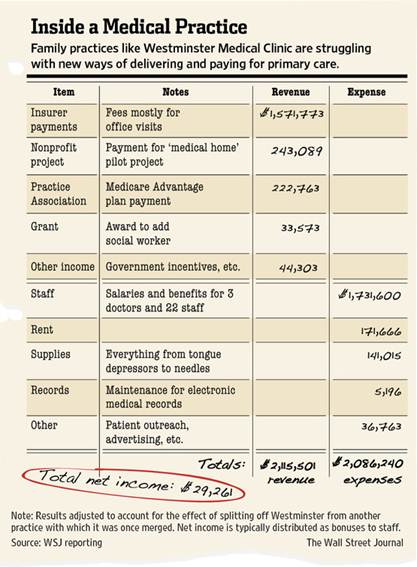Wall Street Journal recently posted an article about Dr. Hammond from the Westminster Medical Clinic in Denver – a 3 provider, 22 staff member, 6,300 patient family practice clinic struggling to stay afloat. They are faced with a myriad of financial issues including lack of reimbursement under traditional insurance contracts. To showcase the financial severity of his practice, Wall Street Journal provided the following snapshot:
CLICK ON IMAGE TO ENLARGE
One of the largest causes of Dr. Hammond’s financial difficulties is that the practice spent $200,000 on their electronic medical record system, an astronomical price for a small physician practice. In addition, the EMR has not allowed him to take advantage of the Meaningful Use incentives of adopting an EMR system. SK&A, a marketing research firm in Irvine, Calif., released a survey on Oct. 2011 that found 51% of those with three to five physicians used EMRs. Only 31% of solo practitioners had EMRs in July 2011; 76% of practices with 26 or more physicians had EMRs. Key highlights of this report is highlighted below:
| July 2011 | October 2010 | |||
|---|---|---|---|---|
| Physicians in practice | Yes | No | Yes | No |
| 1 | 30.8% | 69.2% | 29.0% | 71.0% |
| 2 | 41.6% | 58.4% | 40.1% | 59.9% |
| 3-5 | 51.0% | 49.0% | 47.0% | 53.0% |
| 6-10 | 63.0% | 37.0% | 60.8% | 39.2% |
| 11-25 | 71.6% | 28.4% | 69.6% | 30.4% |
| 26 or more | 75.5% | 24.5% | 72.8% | 27.2% |
Source: “Physician Office Usage of Electronic Health Records Software,” SK&A, Irvine, Calif.
EMR purchase price and lack of understanding in utilizing Meaningful Use incentives are the two largest barriers to EMR adoption in small physician practices. Practices such as Dr. Hammond’s should have considered free EMR solutions out there such as Practice Fusion, Mitochon System, and other low cost alternatives that would alleviate the burden of purchasing for an expensive EMR system and easily qualify for HITECH incentives for greater ROI. Small physician office must properly perform their due diligence when performing an EMR vendor/system selection to ensure that they receive a positive ROI, qualify for Meaningful Use incentives, increased productivity, and quality of patient care. With the EMR adoption rate so low in small physician practices, free to low cost EMR solutions maybe the best viable solution to increase EMR adoption rates.

